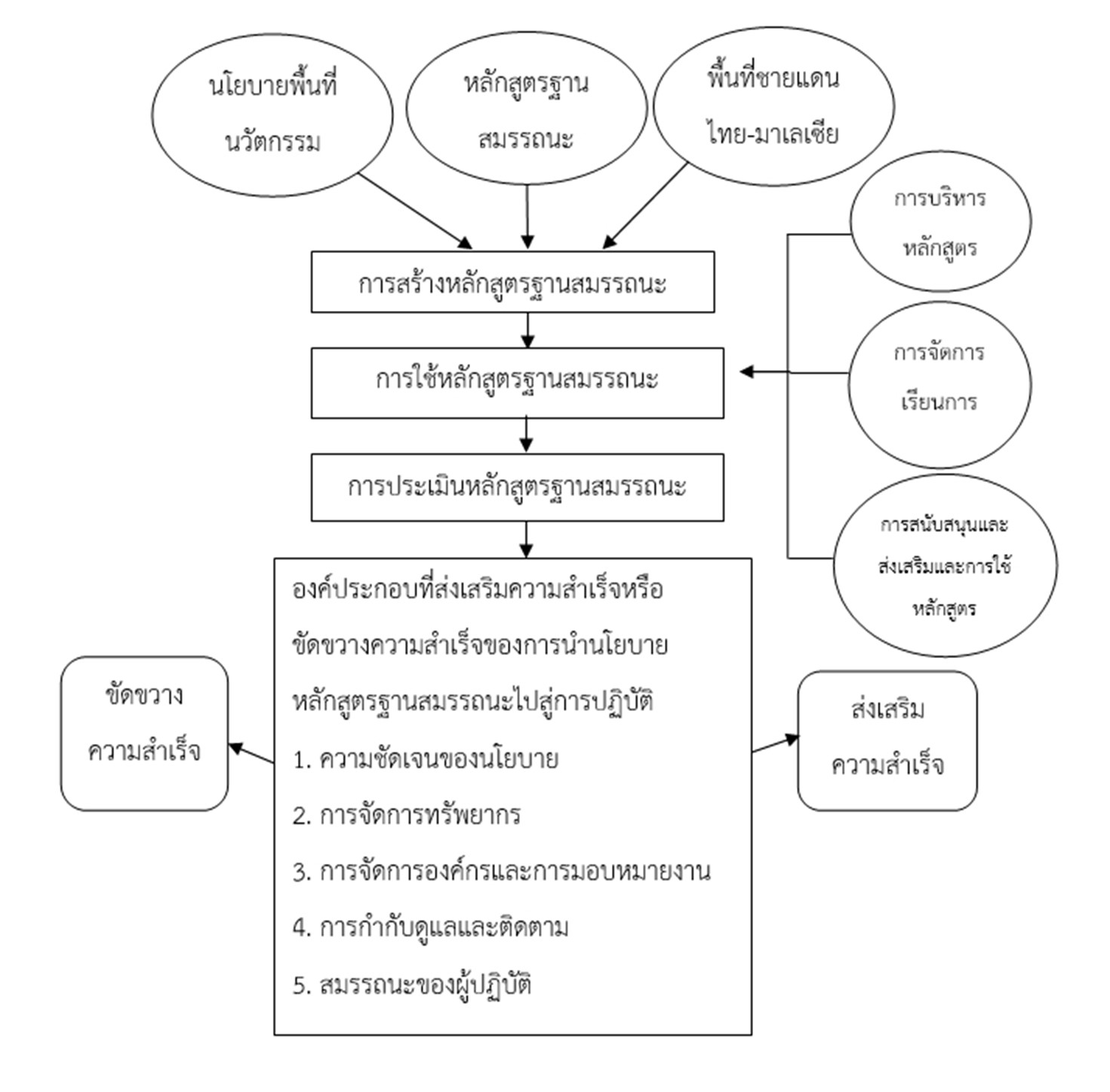The Development of Competency-Based Curriculum of Education-Sandbox Pilot Schools: A Case Study of Government School Located on the Thai-Malaysian Border
DOI:
https://doi.org/10.14456/educu.2024.22Keywords:
curriculum development, competency-based curriculum, education-sandbox pilot schools, government schools located on the Thai-Malaysian Border, policy implementationAbstract
Implementing a competency-based curriculum into practice is still novel at both the policy and practical levels for Thai Education. This study aimed to explore 1) The competency-based curriculum development process and 2) The factors promoting or hindering the success of implementing the competency-based curriculum policy in schools. This research employed the case study of a pilot school in an educational sandbox area located at the Thai-Malaysian border. An interview, observations, and document analysis were conducted for data collection. There were 11 key informants. The research instruments include a semi-structured interview, an observation form, and a document analysis form. Collected data was analyzed by using the content analysis technique. The period of this study was from September 2022 to April 2023. The research results showed that the school competency-based curriculum development process had three steps: 1) curriculum creation, which included 1.1) Training to understand the competency-based curriculum, 1.2) The creation of school concept, 1.3) Learning management unit design, and 1.4) Submitting for approval; 2) Curriculum implementation, which included 2.1) Curriculum administration, 2.2) Classroom instruction management, and 2.3) Support and promotion of the used curriculum; and 3) Curriculum Evaluation by using professional learning communities. The elements that promote success include the school director's competency and the community's readiness to accept the curriculum. The elements that hindered the success of implementation include the lack of clarity in learning evaluation and the lack of understanding of teachers’ learning management. Further study may consider the role of communities and stakeholders in developing competency-based curriculum.
References
ภาษาไทย
กล้า ทองขาว. (2551). เอกสารประกอบการสอนชุดวิชานโยบายสาธารณะและการวางแผน หน่วยที่ 6 เรื่อง การนำนโยบายไปปฏิบัติ. มหาวิทยาลัยสุโขทัยธรรมาธิราช.
ชาย โพธิสิตา. (2564). ศาสตร์และศิลป์การวิจัยเชิงคุณภาพ (พิมพ์ครั้งที่ 9). กรุงเทพฯ: อมรินทร์พริ้นติ้ง แอนด์ พับลิซซิ่ง จำกัด.
ณัฐวัชร จันทโรธรณ์ และ ไพโรจน์ ญัติอัครวงศ์. (2565). การพัฒนาหลักสูตรและการเรียนการสอน. วารสารมหาจุฬาวิชาการ, 9(1), 336-347.
นริศรา มากมี และ ธีรศักดิ์ อุปไมยอธิชัย. (2565). การเตรียมการบริหารหลักสูตรฐานสมรรถนะของโรงเรียนขยายโอกาสทางการศึกษา สังกัดสำนักงานเขตพื้นที่การศึกษาประถมศึกษา พิจิตร เขต 1. Journal of Modern Learning Development, 7(4), 113-127.
พิมพ์กรอง อุปถะ. (2556). การศึกษาปัญหาการใช้หลักสูตรสถานศึกษาของโรงเรียนขนาดเล็ก สังกัดสำนักงานเขตพื้นที่การศึกษาประถมศึกษานราธิวาส เขต 2 [วิทยานิพนธ์ปริญญามหาบัณฑิต]. มหาวิทยาลัยนอร์ทกรุงเทพ.
รัชนี จันใด. (2557). การศึกษาการใช้หลักสูตรกลุ่มสาระการเรียนรู้ภาษาต่างประเทศ (ภาษาอังกฤษ) ในระดับชั้นประถมศึกษา โรงเรียนเซนต์โยเซฟระยอง. วารสารอิเล็กทรอนิกส์ทางการศึกษา, 9(4), 200-212.
รัชยา รัตนะถาวร. (2558). รูปแบบการนํานโยบายส่งเสริมสุขภาพไปปฏิบัติในสถานศึกษาขั้นพื้นฐาน. วารสารวิชาการมหาวิทยาลัยอิสเทิร์นเอเชีย ฉบับสังคมศาสตร์และมนุษยศาสตร์, 5(3), 281-293. https://so01.tci-thaijo.org/index.php/EAUHJSocSci/article/view/44711
รัตนะ บัวสนธ์. (2556). วิจัยเชิงคุณภาพการศึกษา (พิมพ์ครั้งที่ 4). สำนักพิมพ์แห่งจุฬาลงกรณ์มหาวิทยาลัย.
วรเดช จันทร์ศร. (2541). การนำนโยบายไปปฏิบัติ. กราฟิคฟอร์แมท (ไทยแลนด์).
วิชัย วงษ์ใหญ่. (2554). การพัฒนาหลักสูตรระดับอุดมศึกษา (พิมพ์ครั้งที่ 2). กรุงเทพฯ: อาร์ แอนด์ปรินท์ จำกัด.
สำนักงานคณะกรรมการการศึกษาขั้นพื้นฐาน กระทรวงศึกษาธิการ. (2564). หลักสูตรฐานสมรรถนะ. CBE Thailand. https://cbethailand.com/%E0%B8%90%E0%B8%B2%E0%B8%99%E0%B8%AA%E0%B8%A1%E0%B8%A3%E0%B8%A3%E0%B8%96%E0%B8%99%E0%B8%B0/
สำนักงานบริหารพื้นที่นวัตกรรมการศึกษา. (2565). ความเคลื่อนไหวของเรา: ข้อมูล ข่าวสาร ความเคลื่อนไหวต่าง ที่เกิดขึ้นในพื้นที่นวัตกรรมการศึกษา. Education sandbox. https://www.edusandbox.com/video-educationalinnovation/
สำนักงานเลขาธิการสภาการศึกษา. (2562). รายงานผลการวิจัยและพัฒนากรอบสมรรถนะผู้เรียนระดับประถมศึกษาตอนต้น สำหรับหลักสูตรการศึกษาขั้นพื้นฐาน (รายงานการวิจัย). กลุ่มมาตรฐานการศึกษา สำนักมาตรฐานการศึกษาและพัฒนาการเรียนรู้ สำนักงานเลขาธิการสภาการศึกษา กระทรวงศึกษาธิการ.
อรวลัย ชนะมัจฉา. (2561). การใช้หลักสูตรตามทัศนะของข้าราชการครูในโรงเรียนศูนย์เครือข่ายพัฒนาคุณภาพการศึกษาที่ 16 สังกัดสำนักงานเขตพื้นที่การศึกษาประถมศึกษาร้อยเอ็ด เขต 2 [วิทยานิพนธ์ปริญญามหาบัณฑิต]. มหาวิทยาลัยนอร์ทกรุงเทพ.
อับดุลเลาะ เตะโระ. (2558). ศึกษาสภาพปัญหาการใช้หลักสูตรอิสลามศึกษาแบบเข้มของครู ในโรงเรียนสองระบบ สังกัดสำนักงานเขตพื้นที่การศึกษาปัตตานี เขต 3 [วิทยานิพนธ์ปริญญามหาบัณฑิต]. มหาวิทยาลัยนอร์ทกรุงเทพ.
ภาษาอังกฤษ
Cheema, G.S., & Rondineli D.A. (1983). Decentralizing Governance: Emerging Concepts and Practices. Planning Theory, 7(3), 336-338.
Edward, G.C. (1980). Implementing public policy. congressional quarterly press.
Oliva, P. F. (2009). Developing the Curriculum (7th ed.). Boston: Allyn and Bacon.
Sabatier, P., & Mazmanian, D. (1979). The Conditions of Effective Implementation: A Guide to Accomplishing Policy Objectives. Policy Analysis, 5(4), 481–504. https://www.jstor.org/stable/42783358
Taba, H. (1962). Curriculum Development: Theory and Practice. New York: Harcourt Brace Jovanovich.
Van Meter, D. S., & Van Horn, C. E. (1975). The policy implementation process: A conceptual framework. Administration & Society, 6(4), 445–488. https://doi.org/10.1177/009539977500600404.

Downloads
Published
How to Cite
Issue
Section
License

This work is licensed under a Creative Commons Attribution-NonCommercial-NoDerivatives 4.0 International License.



